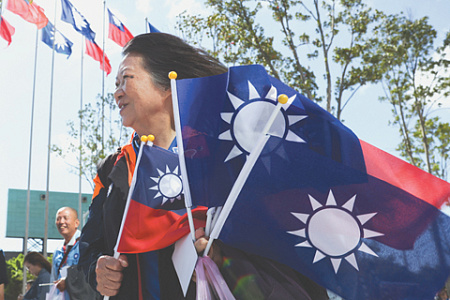
Taiwan’s administration has removed the word “Han” from its website, meaning the identification of the island’s inhabitants with the Chinese, the main ethnic group of mainland China. The goal is for Taiwanese to consider themselves citizens of their country, not mainland China, and become patriots of their state. This bureaucratic ruse does not mean the declaration of independence at all. The Taiwanese authorities will not go that far, given that the PRC would regard it as an act of war. But this step, of course, does not help to reduce tensions in the Taiwan Strait.
Relations between China and the United States, the two superpowers, are always in the focus of global media attention. Naturally, the agreement of Washington and Beijing to reduce mutual duties for 90 days immediately became a topic of discussion on the Web and on the pages of newspapers. At the same time, the Taiwan issue completely dropped out of the commentators’ field of view. Meanwhile, Washington, under President Donald Trump, as well as under Joseph Biden, is bound by the obligation to strengthen the island’s defense. And China has not renounced the use of force in the name of returning Taiwan to the “bosom of the Motherland.”
Against this alarming background, the Taiwanese government has taken a seemingly insignificant step. It removed from its forum the mention of the word “Han”, which implies that the inhabitants of the island belong to the same ethnic group as the vast majority of the population of the People’s Republic of China. Explaining this change, the representative of the authorities argued that it was not a matter of politics at all. After all, in Taiwan, aborigines live in mountainous areas, which make up less than 3% of the island’s population. Nevertheless, it is important that they do not feel violated.
But Taiwan does not have the omnipotence of a single party, as on the mainland. There is a system of democracy in which the country’s leaders are forced to take into account the opinion of voters before making important decisions in the field of both domestic and foreign policy. And in parliament, the ruling Democratic Progressive Party (DPP) has only a relative majority. It is therefore not surprising that the opposition, whose leading force is the Kuomintang Party, did not fail to launch a propaganda attack on the government. A deputy from the Kuomintang accused the authorities of intending to distort the historical past and undermine the island’s ties with the mainland. Of course, this dispute did not have such a wide international resonance as the agreement between Beijing and Washington, which indicates their desire to reduce the scale of the trade war. But on the island, the controversy between the DPP government and the Kuomintang was called a cultural war.
In an interview with NG, Vasily Kashin, a sinologist and senior researcher at the Higher School of Economics, noted: “The Taiwanese authorities are striving to build a separate identity that will be linked to Taiwan and will not be linked to mainland China. That is, they do not directly talk about the new ethnic group, but avoid references that link the population of Taiwan to the Han ethnic group. And although the Kuomintang no longer talks about the reunification of the island with the mainland, it calls for respect for the Chinese cultural heritage. This is one of the points of disagreement between the Kuomintang and the DPP. Both parties do not repeat the formula “One country, two systems” used by former informal Chinese leader Deng Xiaoping, but the Kuomintang insists that the Taiwanese are also heirs of great Chinese culture. By the way, on the mainland, officials write Han in their documents when they need to indicate their nationality, unless, of course, they belong to national minorities. And on the island, the DPP avoids discussing this topic, highlights the problems of national minorities. That’s why the authorities have blacked out the page mentioning Han. This is everyday life on the island. The DPP is very consistent on this path. Her task is to show that there is a new community, different from the mainland. There are ethnic groups in Taiwan, but they account for about 2.6% of the population. And 96% are Han Chinese. This is the reality that the DPP wants to correct.”
In mainland China, the Internet is mostly under the control of the authorities. Nevertheless, foreign bloggers have somehow managed to ask a fairly large number of users what they think about the Taiwan issue. Almost all respondents answered: there should be no use of force.
